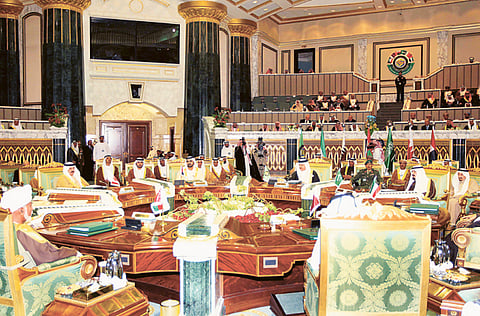GCC tells Iran to stop meddling
Saudi Arabia expresses readiness to negotiate with Tehran in bid to boost ties

Dubai: In a strongly-worded call, the six Arab Gulf states told Iran to stop meddling in their internal affairs. At the same time — and as part of the GCC's policy in dealing with Iran — they kept the door half-closed. Heavy-weight Saudi Arabia expressed its readiness to negotiate with Tehran on improving relations between the two sides.
"Stop these policies and practices …and stop interfering in the internal affairs of the Gulf nations," said the statement at the end of the GCC annual summit in Riyadh.
However, during the press conference, Saudi foreign minister Prince Saud Al Faisal said the kingdom was prepared to negotiate with Iran to improve relations, press reports quoted him as saying.
Neighbour
"The GCC always keeps the door ajar for Iran and others," said Jamal Khashougji, Director of the newly-established Arab News Channel. "But there is really a feeling of discomfort [in the GCC] from the Iranian interferences in the internal affairs of Arab Gulf states. "Iran will always be our neighbour, but not necessarily Ahmadinejad," Khashougji said in reference to the Iranian president who is blamed by the GCC for the deterioration in relations between the two sides after they improved under his predecessor Mohammad Khatami.
Saudi-Iranian relations have deteriorated since 1,000 Gulf troops entered Bahrain to help crush Shiite-led unrest in February and March.
GCC countries have repeatedly accused Tehran of attempting to destabilise their internal security, and attempting to instigate sectarian strife. Iran, on the other hand, rejected these accusations and criticised how the GCC dealt with their Shiite citizens. The already tense Saudi-Iranian relations took a turn for the worse when US justice officials announced in October that they had foiled an Iranian plot to assassinate the Saudi ambassador to Washington Adel Al Jubair.
Though the Iranian intelligence chief was in Riyadh last week to clear up "misunderstandings" regarding the alleged assassination plot, tensions between the two nations remain high, and Khashoughi noted the issue with Iran was much more than just interference. "There is an international counter-attack, which Saudi is participating in, against Iran.
"There is a sense that Iran doesn't understand anything but the language of force," he added in reference to the recent boost of international sanctions against Iran because of several issues, including Tehran's controversial nuclear programme and the Iranian plan, which the US announced earlier, of an attempt to kill the Saudi Ambassador.
‘Important elements'
"The most two important elements of this campaign, or counter-attack, is to surround the central bank of Iran and its oil capacity."
Also the GCC called on Iran to "fully cooperate" with the International Atomic Energy Agency and work to resolve regional conflicts "peacefully," adding that GCC nations were still committed to a Middle East "free of weapons of mass destruction."
The West fears Iran's nuclear programme masks a push to develop an atomic weapons capability, a charge Tehran denies.
— With additional inputs from agencies



